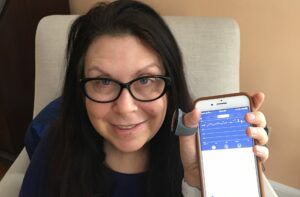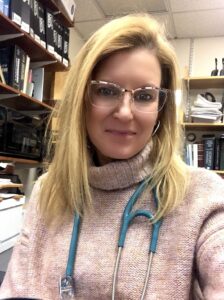By Brett Peruzzi, Managing Editor

REGION – It’s been increasing in recent years due to technology enhancements. The shortage of medical staff and available appointments during the COVID-19 pandemic has accelerated it dramatically. DIY (Do It Yourself) healthcare is here to stay and may represent a good portion of the healthcare of many people in the future.
So what is it? Essentially, it’s taking a more active role in your healthcare, using everything from smartphone apps to at-home electronic medical devices and tests.
Apps compile data for easy recordkeeping and analysis
Most of us are carrying around very powerful little computers in our pockets or purses: smartphones. People are using smartphone apps (sometimes paired with electronic devices) to record, track, and analyze everything from their medications to their exercise, migraines, foods eaten, to record allergy symptoms or digestive ailments, to glucose levels, for diabetics. It’s certainly a lot easier and more efficient than using a pencil and paper, and at your next medical appointment you’ll have the data readily available to share with your provider. Many apps are free; some may cost a few dollars to download, and a few sophisticated ones may have a monthly subscription fee.
At-home devices proliferating
Not too long ago, the only medical device you might find in the average household was a thermometer to measure body temperature if you felt feverish. No longer. Fitbit wrist monitors and the Apple Watch can not only check your heart rate, but your oxygen level as well. During the pandemic, many COVID-19 patients have been sent home from the hospital with fingertip pulse oximeters to monitor their own oxygen levels as they recover. Other devices monitor not just your oxygen levels at night but also the overall quality of your sleep.
Blood pressure monitoring has become much easier too, with more compact devices, digital displays and the ability to store readings over time. Checking glucose levels has long been part of the daily routine of diabetics, but new devices that don’t require pricking your finger for a blood sample bring ease and convenience for those who aren’t diabetic but want some insight into their blood sugar levels. You can even perform your own heart EKGs at home, using a fingertip device like KardiaMobile, which, paired with your smartphone, can detect six of the most common arrhythmias, or irregular heart rhythms, which may be indicative of a serious cardiac issue.
More at-home test options
Nearly all tests to detect infection or disease have typically been performed in medical facilities, often an outpatient lab for blood draws. But the pandemic has changed that too in the past year, as millions of people have self-tested at home for COVID-19. And rather than undergoing a colonoscopy, more older people are choosing to do an at-home colorectal cancer screening via a stool sample using test kits like Cologuard. Nowadays, in addition to doing home blood tests for your glucose level, you can also test for everything from cholesterol and thyroid levels to vitamin deficiencies. And while younger women have been able to do home pregnancy testing with urine samples for decades, you can now screen your urine with a home test for an affliction common with older adults: urinary tract infections.
Patients like having more options for treatment
Robyn Gold has embraced one particular DIY healthcare device. The 62-year-old Framingham resident was diagnosed with sleep apnea several years ago after undergoing an overnight sleep study at a medical facility. She tried and couldn’t adjust to using a CPAP machine while sleeping, which involves wearing a mask that delivers air pressure through the nostrils to keep the airway open.
“I discovered the Wellue 02Ring and immediately decided to give it a try,” she said. “What makes sleep apnea harmful is that it deprives your body of oxygen. The 02Ring enables me to monitor my oxygen levels overnight and it buzzes me awake when they go below a pre-set threshold,” she explained. “It stores sleep data in an iPhone app so I can pore over last night’s sleep records and review sleep trends over time.”
She noted that her oxygen levels stay high most nights and the 02Ring never wakes her up. When it does go off, the act of waking up restores her normal breathing, and she goes back to sleep.
“So, although I bought the device to monitor the state of my medical problem,” Gold explained, “for my mild case, it is able to treat it as well. I am very happy with my device! I even discussed the plan with my doctor, and she approved.”
Medical professionals see benefits as well

Nurse practitioner Karen Ashworth of Somerville has seen DIY healthcare strategies work particularly well for people with food sensitivities.
“I’ve seen people reclaim their lives and feel so much better, ” she said. She referred an adolescent patient with multiple symptoms to an allergist who diagnosed her with food sensitivities. “She felt miserable and was missing a lot of school,” Ashworth explained.
The patient took control of her diet and avoided foods she was sensitive to, essentially healing herself, now that she had the right information to work with. “A year later I saw her for her well check,” said Ashworth. “She said she felt like a new person.”
And Ashworth has applied the same DIY techniques to her own healthcare, after suffering from a variety of inflammatory symptoms. “I was frustrated with the care I received as a patient,” she said. “Medicine has become very specialized. Sometimes patients get lost in the cracks, and continuity of care can be lacking. I realized that if I wanted to feel better, I needed to learn as much as I could on my own.” Ashworth’s issues also were related to food sensitivities. “After I removed the foods I had become sensitive to from my diet, my symptoms resolved,” she noted.
Not without risks
There are several risks with DIY healthcare. These include misinterpretation of at-home results, self-misdiagnosis, and not seeking treatment for a condition when it is needed and missing other problems entirely.
While it can be helpful to research your symptoms on the web, relying too much on “Dr. Google” has its pitfalls. First, you can worry yourself needlessly about having an affliction that you don’t have, and worse, you could get false assurance that you’re fine. It’s always a good idea to seek professional medical help to get a definitive diagnosis of any potentially serious health conditions.
DIY healthcare has changed the landscape of the industry forever, with many positive improvements. In some ways it may harken back to the days of folk remedies and home treatment before modern medicine, but it has more scientific backing because of technological advancements. While it’s obviously far from a cure-all, it’s another tool in the box to managing your health.
RELATED CONTENT:
Oral health is key to overall well-being (fiftyplusadvocate.com)
Improve your brain health with meditation (fiftyplusadvocate.com)
Regular exams are a key step in maintaining eye health (fiftyplusadvocate.com)












